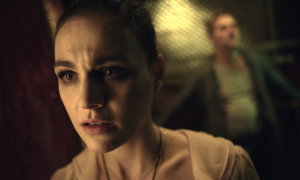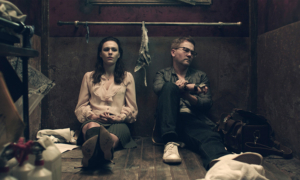To coincide with the home release of psychological horror-thriller hybrid, Stalker, we spoke to the filmmakers to find out how this daring film came to fruition. Hearing from actor-producer and BAFTA winner, Stuart Brennan (pictured above), director Steve Johnson and screenwriter Chris Watt, we delve deep into what became one of the year’s biggest surprises at FrightFest 2022.
In this tense story, Rose Hepburn, a young actress, returns to her empty hotel. Forced to use the old freight elevator, it jolts to a halt on the twelfth floor, leaving her trapped with an unusual stranger. Left with no phone signal as a storm approaches, tensions escalate and suspicions rise when Rose discovers the identity of the mysterious man is Daniel Reed, a camera operator who is seemingly obsessed with her. The film stars Sophie Skelton (Outlander), Stuart Brennan (Risen) and features wrestling legend, Bret Hart.
So how did it all begin?
Chris, since you wrote the script, how did you arrive at Stalker?
Chris Watt: It started about five years ago after I was trapped in a lift for a few minutes with other people, stuck between the second and third floor. It was brief but made an impact on me. I decided to file that experience away because I’m a fan of taking a simple concept and using it as the basis for a bigger story. Once we hit the first lockdown during the pandemic, I married this idea with what I thought could be a project using fewer actors, fewer locations and minimising everything, because that’s where productions were heading. It took me about two weeks to write the first draft and it flowed quite quickly. I’ve known Stuart [Brennan] through the British Independent Film Festival and he was curious to take a look. I think he read it in around a day?
Stuart Brennan: Yeah, I came across it on Twitter! You’d mentioned that you were looking for people to read this two-hander script. That’s proof it can be good putting yourself out there! My company, Stronghold, had just finished a movie shot during the pandemic with 300-400 people. After that, I wanted something with minimal cast, crew and locations. Reading the script, it ticked all those boxes. The script was great but needed development, so the first port of call was finding a director to oversee that process. We went out to a number of people and Steve [Johnson] came back connecting most strongly with the material.
Steve Johnson: The script had a very interesting story with two people trapped in an elevator for 90 minutes. It’s right up my street in terms of building character and drama, though I knew it would be a challenge because there’s nowhere to hide, nowhere to cutaway to.
SB: After optioning the script and going through rewrites, we went into almost three months of pre-production including research, designing the elevator, costumes, casting. Then Stronghold Workshops built the set which was the first we’d ever done, very exciting.
How did you approach casting and, Stuart, did you always plan to play one of the lead roles?
SB: Whenever I read a script as a producer, I’m always thinking about it as an actor, because I have the same hours in the day as everyone else! The opportunity to combine those hours with two jobs into one project is always top of the list. I knew I wanted to play the character of Daniel, who was very complex and beautifully written. Knowing that I’d be trapped in a box with another actor, casting for the other role became very exciting. We looked at all sorts of actors, from A-listers to up-and-coming actors, and diversity was a big focus too. However, as with any casting, it came down to who responded best to the material, and who was available.
Sophie Skelton has consistently done exciting work and the fan following she’s gained from Outlander is so well deserved because she’s so talented. She was the first person the script went to, who read it immediately, and came straight back to us wanting to do it. Then it became a question of whether she could make our schedule. We had a moment where it looked like the timing wouldn’t work, but fortunately it came together. We were maybe two weeks out from filming, she said “give me a week.” I think around four days later she came back and said her TV schedule just changed so we could lock it in!

Without giving too much away about his character, Stalker has an appearance by wrestling legend Bret Hart. How did that come about?
SB: Bret has become a good friend as we worked for a number of years on a project that unfortunately still hasn’t seen the light of day, as is the nature of this industry. Bret is very passionate about filmmaking, and despite his path taking him through an amazing showbiz career in pro wrestling, he’s held onto that passion. He’s made appearances in various films and TV shows and is a very talented actor in his own right.
During casting for that role, we threw around lots of names who could bring a different audience, and Bret’s name was always there. So we asked if he’d be interested, he read the script and loved the idea of playing this role. We just had to get him at the right time. He was in the UK at one point, but the scheduling didn’t work, so we ended up shooting his role on green screen in Calgary, Canada in a kind of VFX shoot and implemented it into the film.
How much did you want the written dialogue to stay the same, or were you happy to see it evolve?
CW: What works on the page doesn’t always work on camera. When you have actors working on their characters, they need to bring it to life and make that dialogue sing. I’ve never been precious about changing dialogue. There are probably story references you can’t really touch but, apart from that, it’s fascinating and exciting to hear different inflections actors put on certain words and how things can take on a new meaning and subtext.

What’s your best scene, or moment, from making Stalker?
SB: The best one for me would be the finale because it was just so much fun. I think those last scenes are an actor’s dream and Sophie had so much to play with and took the opportunity to give it 110%. I didn’t have too much to do in those scenes, but I got a front row seat to enjoy it, and it was a thrill.
SJ: Everyday was a wonderful day because I got to stand behind the monitors and see two very talented actors spar with each other through words. I think the job of a director is to see it unfold from an audience’s perspective and make sure we’ve got what we need to tell the story. These were very long takes and it was stressful for the actors, so I was mindful of that, but you get completely mesmerised by the performances.
CW: As I’m still relatively new to this process, it’s simple things like getting the phone call to say that Sophie was doing the film, or experience the process of developing the script, seeing scenes come together, or seeing the first cut of the finished trailer. These are very special moments for me.
Did you have any happy accidents while making Stalker?
SB: Going back to what Chris was saying, I do think the most wonderful gift for a writer is watching actors take dialogue and perform it in a way you weren’t expecting them to, and hopefully adding something. From an acting point of view, all we’re trying to do is mine the script and find the hidden gems. For Sophie and I, one of our favourite things was finding subtext and would riff on dialogue and find ways to challenge each other and say things from a different perspective. That was a great experience.
CW: In the early script, the third act was essentially one long monologue from one person. During the filmmaking process, it was reconstructed in post-production and the way Sophie played it was brilliant and it would never have come to me like that. Film is the only artform where you can play with time and perception, then the editing becomes so important and gives it a pace and rhythm. It’s an amazing process.
SJ: I agree with Chris. In the script, the finale was good but linear. We had the freedom in the edit to try it this other way and it works and adds a sense of horror and dread, which is exactly what you hope for in the climax of a genre film like this.
What do you hope audiences take away from Stalker?
SB: I think it’s quite an indulgent movie. Settle down with your favourite cocktail or a glass of wine and relax into it. It’s not a jump scare film, but you’re going to get drawn into it. I think it’s one to share with someone, because it’ll raise questions you’ll want to talk about after. I’ve heard this from a lot of people who’ve seen it already.
CW: I want the audience to feel like they’re trapped in the lift too. I don’t think it’s trying to manipulate emotions, there’s many ambiguous aspects to the story. I hope it leads to questions and debate afterwards, because there’s a lot going on with these characters.
SJ: I really hope people get drawn in, go along for the ride and enjoy it. It may even reward repeat viewings to pick up on different details and clues along the way. I also raises complex questions… does the punishment fit the crime?
Kaleidoscope Home Entertainment presents Stalker on DVD and Digital from 10 October
